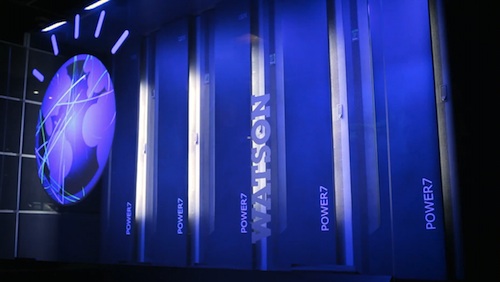This article appeared in the UK edition of Wired in February, but it got upvoted on Reddit today and I saw it there; I’m not sure if the precise original publication date matters, because I don’t think it’s breaking news. People have been talking about Watson as an oncological source of information / potentially the future of health care almost since the first press release about its development.
Firstly, I had no idea how Watson actually works, so I wanted to hit on that before anything. Here’s the basic Wiki, which seems like a good jumping off point. Apparently, the system was specifically developed (by David Ferrucci) to answer questions on Jeopardy. When it actually appeared on Jeopardy (it won $1 million), it wasn’t connected to the Internet in any way, but it had access to 200 million pages of structured and unstructured content (4 TB of disk space), including the full text of Wikipedia. First thought: Jesus Christ. There are a lot of rabbit holes one can go down on that site. If the clues were short, or contained only a couple of words, Watson had problems. Otherwise, it dominated.
The basic working principle seems to be parsing keywords from the clue, then searching for related terms as responses (Watson would be an amazing Fortune 500 recruiter). It can process about one million books per second.
The key with Watson and health care isn’t really about replacing doctors — you can’t actually do that, because society isn’t ready for a moment when machines are breaking the news to you that you have cancer — but rather, “utilization management” or “six sigma.” Those are fancier, MBA terms for reducing waste in a business process. By some estimates, $2.3 trillion is spent on health care in the U.S. every year; 30 percent of that might be waste. In the field of oncology, given how specialized different types of cancers are, it could take a doctor 160 hours a week (news flash: there are 168 hours in a week as is) to keep up with current literature. Watson would allow doctors to have a resource at their side for scanning all the available medical literature and making more informed, faster decisions. Wellpoint, which is doing the Watson-oncology project with Sloan Kettering, says the successful diagnosis rate for lung cancer is 90 percent. For human doctors, it’s 50 percent. That, plus the more effective use of time and resources, is a good thing for health care.
Watson is now working with MD Anderson, living it up at RPI (where my dad went to college), as well as teaching medical school students. The latter is a great thing, if you believe that by 2025, demand for doctors will be 90K greater than supply. Clearly, the process of creating a new doctor needs to be a little more effective, and Watson — which by some estimates can learn as much as a second-year medical student in about 1/25th of the time — could be a strong asset here.
There are critics, though: the information that artificial intelligence systems draw on can be flawed, and just last summer, IBM’ers tried to load Urban Dictionary into Watson. It was able to parse some of it, overall got confused, and they had to scrub that data from the system. Plus, Watson could theoretically bring costs down, but it might be a long way from making the U.S. system any less complicated.

4 Comments
Comments are closed.